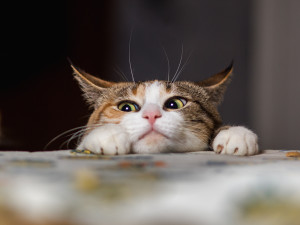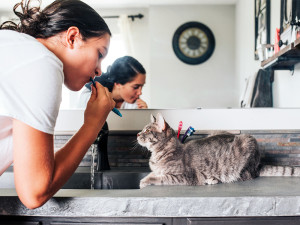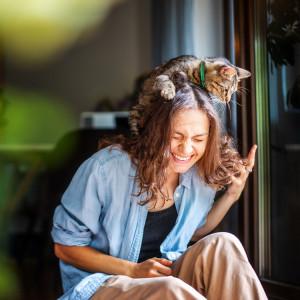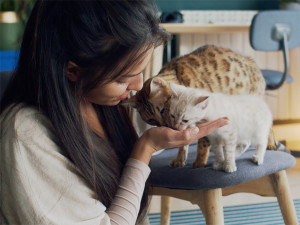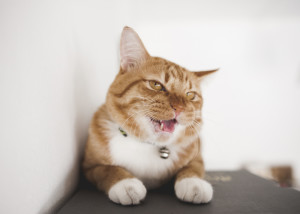Why Does Your Cat Guard You When You Pee?
Sometimes you don’t need guarding—you just need a little privacy.

Share Article
In This Article:
What Is Guarding? Reasons Your Cat Is Following You Into the Bathroom Should You Discourage Guarding? How to Train Your Cat to Change Guarding Behaviors
Once you become a pet parent, you’ll quickly learn that going to the bathroom alone is a thing of the past. Anytime you need to use the restroom and close the door, your cat will immediately begin to paw at the door and meow, insisting on coming in and hanging out while you’re doing your business.
Is this the new after adopting a kitty? It doesn’t have to be. There are many different reasons why cats want to be with their people while they are in the bathroom. Let’s explore why they are behaving this way, and how to prevent the behavior.
Main takeaways
Cats guard because they want to protect something or someone they care about.
There are many reasons why your cat follows you to the bathroom, ranging from wanting a routine and being curious, to possibly feeling anxious or stressed.
You can train your cat to change their guarding behavior if it’s something that bothers you.
What is guarding?
Feline guarding can mean a couple of different things.

It can refer to a cat aggressively protecting something they value in a home. “I see guarding more often between cats, when a cat guards a resource, such as sitting in front of the feeding station or litter box,” Jennifer Van de Kieftopens in new tab, a feline behavioralist and feeding coach, says, “particularly when resources are not well spread out in a home.”
However, guarding can also be a way that a cat is protective of their pet parent. This is their way of being alert to other people or animals by following their own around the home, including into the bathroom.
Reasons why your cat is following you into the bathroom
Your cat might follow you into the bathroom for many positive reasons. Van de Kieft also points out, “Cats do not like closed doors, and they often want to be in the same room as their guardians.”
Here’s a closer look into their motivations behind following you into the loo.
1. It’s a protective instinct.
Your cat may be encroaching on your bathroom time because they are protecting you. Signs to look out for include your kitty sitting close to you, following you, staring at you, meowing, and scratching at closed doors.
2. They crave routine.
Cats want routine in their lives. This helps cats feel happy and grounded, keeping them in good health. So following you to the bathroom may become a part of your cat’s daily routine.
3. They seek your attention.
If you are in the bathroom alone and your cat comes inside, they perceive it as a place where they can get your undivided attention.
4. Your cat may be battling boredom.
Aside from getting your attention, your cat may enter the bathroom because it’s a different location in your home — and that can relieve their boredom. If boredom is something that may be plaguing your cat, try incorporating more playtime and interactive toys into their day.
5. They are curious.
Cats love knowing what’s going on with everything, so it makes sense that they would want to go into the bathroom to experience all the different sounds and smells. Your cat just doesn’t want to miss out on anything.
6. They are feeling anxious or stressed.
Your cat following you into the bathroom may be a sign that they are anxious or stressed. Be sure to read your cat’s body language, and look for any environmental changes in your home that may be causing them discomfort.
7. They may be asserting dominance.
This may be a way your cat is being dominant, or territorial, which comes naturally to cats. They want to observe everything in their environments — so if you close a bathroom door, they are going to want in.
8. They don’t want to feel abandoned.
Your cat might feel like you are abandoning them if you go to the bathroom and close the door. While this is cute in theory, you should make sure it’s not a sign of separation anxiety that’s causing your cat distress. Pay attention to your cat’s other behaviors. If separation anxiety could be a factor, you may want to call your veterinarian.
9. They like the bathroom sensory experience.
Bathrooms are a complete paradise for cats. There are all kinds of new smells and sounds. Some cats may like the running water of the sink or bathtub, and try to drink from it. Other cats may like to curl up in the sink and sleep. The toilet paper roll can be a constant source of interest. It’s a room in the house that holds all kinds of curiosities for your feline friend.
10. They want to help you or comfort you.
Your cat might think that coming to the bathroom is a way of helping you — or comforting you — while you are doing whatever you need to do in there. Some cats like to sit on the sink while their person is in the shower, waiting until they are done to go about the rest of their day.
Should you discourage guarding behavior?
That depends on your preferences. For some pet parents, a constant cat presence in the bathroom can feel overwhelming or inspire the need for more personal space. Van de Kieft says that you only need to discourage guarding behavior if it’s something that bothers you, or if it seems like there might be an underlying issue behind it. Like, some cats may take guarding behavior to the extreme by being overprotective. Read your cat’s body language to see if they appear stressed or aggressive.
How to train your cat to change specific guarding behaviors
If you want to discourage guarding behavior, there are many ways to go about it. You can start ignoring your cat when they come into the bathroom as a way to curb the behavior. This way, your cat might begin to associate coming into the bathroom with not getting attention from you. “Provide an alternative behavior,” Van de Kieft adds. “Clicker training is a great way to do this, as you can train your cat to do something else, such as sit on their mat and high-five you.”
FAQs
Why does my cat rub against me while I’m on the toilet?
Your cat may rub against you while you’re on the toilet to scent-mark you, to show that you are theirs. This might also be a way of showing you affection.
Why does my cat get affectionate when I’m on the toilet?
Your cat might become affectionate when you are on the toilet because there are fewer distractions for you, so you can focus on them. Additionally, the bathroom is usually a warm, secure spot and heavily associated with your scent — and both are comforting to your cat.

Kerensa Cadenas
Kerensa Cadenas is a writer based in New York City. She’s previously worked at The Cut, Thrillist, Cosmopolitan, and Complex. Her work has been featured in Vulture, GQ, Vanity Fair, and others.
Related articles
![Bodil Jane illustration, someone waters a garden with a brown dog in it]()
Nature vs. Nurture: Does Your Parenting Style Influence Your Pet’s Behavior?
Your personality may actually have something to do with your pet’s personality.
Why Is My Cat Suddenly Clingy?
They’re never far away, but you’d like a little distance.
![kittens licking woman's hand]()
Curious Cat Behavior: Why Does My Cat Lick Me?
Hey, everybody’s got their thing.
![a cat making a strange face with its mouth open.]()
Is Your Cat Judging You?
That disapproving sneer is actually the “Flehmen response.” A cat behaviorist explains how to read cats’ lips.

